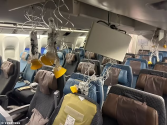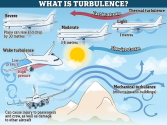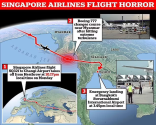Dotta
Well-Known Member
- Joined
- Jan 23, 2021
- Messages
- 10,658
- Reaction score
- 64,371
"Brit, 73, dies and 23 are injured, seven critically, when extreme turbulence hits Singapore Airlines flight from UK.

Terrified passengers have described how they had little warning to put their seatbelts on before the aircraft suddenly dropped,
with one passenger saying people were
'launched into the ceiling'
as the plane fell through the sky.
Of the plane's 211 passengers and 18 crew, one person was left dead and 23 were injured. Of those, officials said seven suffered critical head injuries.
The passenger who died onboard a Singapore Airlines jet travelling from the UK today was a 73-year-old British man, Thai officials have confirmed."

Passenger on board Singapore Airlines jet from UK describes turbulence
After around 11 hours of flying time from take off in London, the aircraft bound for Singapore sharply dropped around 6,000 feet in just five minutes, causing chaos in the cabin.
Last edited:










